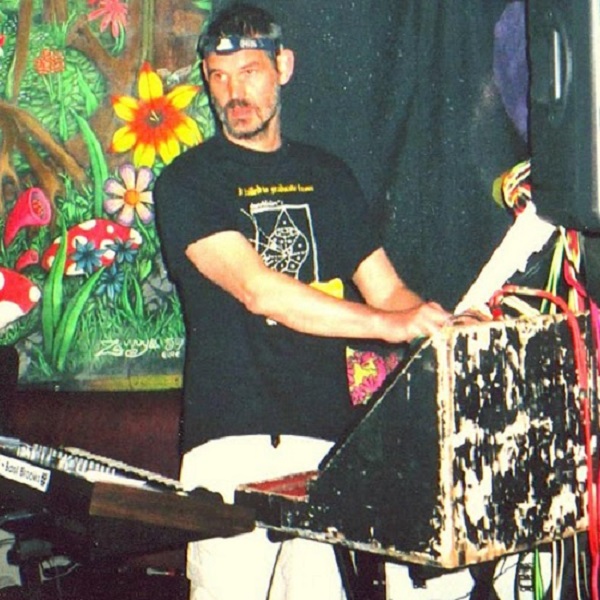
From the Planet Zorch Vintage Analogue Synthesizer workshop with Basil Brooks, founder of Zorch* (1973), the first all synthesizer band, will host along with his 44 year old synthesizer a musical fantasy in the old Durusa, from Glastonbury until now. The workshop will take place in the crossroads’ house’s barn.
Road Runner Society: You and your synthethiser go way back. What’s your love story?
Basil Brooks: Yes indeed that’s true.
When I was 15 my uncle Edward Williams who was a film music composer (he wrote the music for Life on Earth with David Attenborough) invited me to come and help him work on some electronic music for a film, he had just bought an EMS synthesizer for his home studio.
It was love at first sight. I saved some money and in 1972 I was able to buy an EMS Synthi AKS the same one I have today!
Road Runner Society: Analog vs. Digital?
Basil Brooks: Well they both have their benefits.
Analog synthesizers generally have a nice warm sound with nice distortion from the electronic circuits, also they have plenty of knobs and other controls which means you have a close connection to the machine.
Digital synthesizers either dedicated or on a computer have incredible power to create pretty much any sound you can imagine. Also when you find a good sound you can save it and use it again, with old analog you often have to write it down then re-create it by hand.
Road Runner Society: Can you tell us a few words about your workshop? Just a sneak peak.
Basil Brooks: Well it will be quite simple really. I will start with a short explanation of how a synthesizer works and the different modules that make up the sound. At the same time I will demonstrate the principles using my synthesizer to make some sound.
After that we will have some one to one sessions where people can learn to make their own sounds and play with the controls to see what happens.
I should mention that this will be without a keyboard so the sounds will be more abstract than melodic, but the same principles apply to both.
Road Runner Society: It’s been 3 years since you have started to come to Durușa SummerHills. What inspires you to return every year to our neck of the woods?
Basil Brooks: Firstly: All the special people who organise the festival make it feel like you are part of one big family.
Secondly: Durusa is a beautiful natural place to visit.
Thirdly: Some great music and a fantastic party.
Road Runner Society: What’s your favourite happening from the previous editions?
Basil Brooks: Don’t really have a favourite, I love it all! But I did very much enjoy Duff Disco last year.
Road Runner Society: How did the music festival vibes changed throughout the years? (in general)
Basil Brooks: Well when I first started going to festivals in the 70’s they were often free and people just brought along whatever they had to contribute. Again it fealt like we all belonged to the same family.
Of course after that festivals started to get bigger and more commercial so the atmosphere changed and the emphasis became more about seeing the big bands and not so much about just being with other people.
So now I like to go to small festivals in Romania and England because those festivals are more about the people, making new friends and just having fun together.
<><><><><><><><><><><><><><><><><><><><><><><><><><><><><><><><>
*Zorch, who formed in 1973, were an early English totally electronic band, pioneering integrated performances of synthesizers and lightshow. Originally a four piece, by 1975 Zorch were performing as a duo: Basil Brooks and Gwyo Zepix played three monophonic EMS analogue synthesizers, but were augmented by Silver (dance) and a full-on psychedelic light show. At times reminiscent of Tim Blake as well as Tonto’s Expanding Head Band, their repetitive melodies, extended improvisation and thumping sequenced bass created a unique musical style that anticipated techno and trance. In the days before polyphonic synthesizers and personal computers, they filled out the sound using two reel-to-reel tape machines as a delay line.


